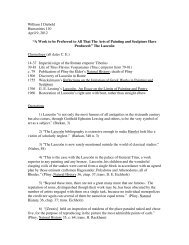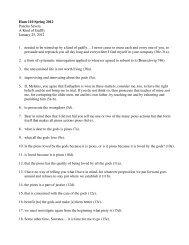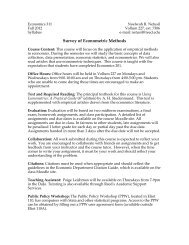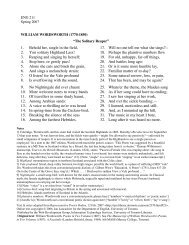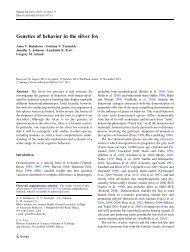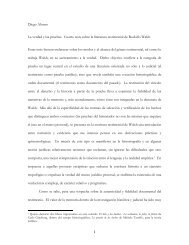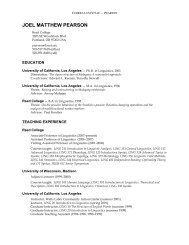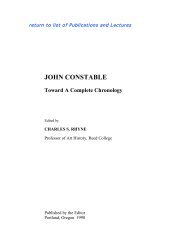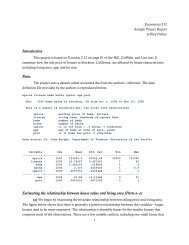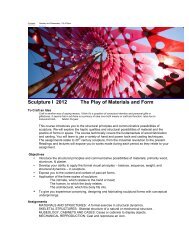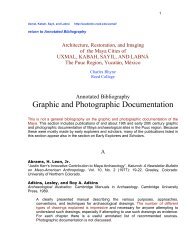Lecture Handout
Lecture Handout
Lecture Handout
You also want an ePaper? Increase the reach of your titles
YUMPU automatically turns print PDFs into web optimized ePapers that Google loves.
Terms: thetes, chora, herms (ithyphallic)<br />
Quotations:<br />
1. As soon as it was day Nicias put his army in motion, pressed as before, by the Syracusans and their<br />
allies, pelted from every side by their missiles and struck down by their javelins. The Athenians<br />
pushed on for the [river] Assinarus, impelled by the attacks made upon them from every side by a<br />
numerous cavalry and the swarm of other arms, supposing that they should breathe more freely if<br />
once across the river, and driven on also by their exhaustion and craving for water. Once there they<br />
rushed in, and all order was at an end, each man wanting to cross first, and the attacks of the enemy<br />
making it difficult to cross at all; forced to huddle together, they fell against and trampled one another,<br />
some dying immediately upon the javelins, others getting entangled together and stumbling over the<br />
articles of baggage, without being able to rise again. Meanwhile the opposite bank, which was steep,<br />
was lined by the Syracusans, who showered missiles down upon the Athenians, most of them<br />
drinking greedily and heaped together in disorder in the hollow bed of the river. The Peloponnesians<br />
also came down and butchered them, especially those in the water, which was thus immediately<br />
spoiled, but which they went on drinking just the same, mud and all, bloody as it was, most even<br />
fighting to have it. (Thucydides 7.84, trans. Richard Crawley, rev. by Strassler)<br />
2. What made the Peloponnesian War inevitable was the growth of Athenian power, and the fear which<br />
this caused in Sparta. (Thucydides 1.23, trans. Rex Warner) I think the truest cause, though least<br />
spoken of, was that the Athenians, in growing to great power and furnishing an occasion of fear to the<br />
Lacedaemonians, compelled the latter to go to war (Thucydides 1.23, trans. Raphael Sealey, rev. by<br />
Arthur Eckstein)<br />
3. In the passage of greatest relevance here, 1.23.5-6, Thucydides' summary of the causes of the war<br />
between Athens and Sparta appears to stress-- to the delight of political scientists--the crucial role of<br />
a power-transition crisis. Political scientists define such a crisis as a response to a perceived dramatic<br />
shift in the distribution of the capabilities of the states within an anarchic system. The shift can either<br />
take the form of a dramatic increase in the capabilities of one of the major units in the system, and/or<br />
a dramatic decline in the capabilities of another major unit, either in absolute or relative terms. When<br />
the distribution of privilege, influence, and territory within a state system becomes severely<br />
mismatched with changing realities of power, the result tends to be large-scale, often system-wide,<br />
war that in turn creates a new configuration of privilege, influence, and territory better matched with<br />
the distribution of power. In other words, historically the realignment of the structure of power and<br />
privilege within an anarchic state system has tended to be accompanied by great violence: what the<br />
political scientists call 'hegemonic war'. (Eckstein 758-59)<br />
4. With the Greeks we enter a new world. . . . No less than anything else, perhaps more so, the Greeks<br />
affected the practice and the theory of government. What they worked here was a revolution. From<br />
the beginning of recorded history in Sumeria and Egypt—for some two-and-a-half thousand years—<br />
every constituted state had been a monarchy: not only in the known world of the Middle East and<br />
eastern Mediterranean, but in the worlds of India and distant China too. These monarchs had all been<br />
absolute, and godlike too, except for the Jewish kingdom where God ruled the kings. Suddenly there<br />
was government without kings or god. Instead, there were man-made, custom-built republics of<br />
citizens. These Greek polities speak to us in a modern idiom . . . . (Finer, Vol. I, 316)<br />
5. At least the people think themselves worthy of taking money for singing, running, dancing, and<br />
sailing in ships, so that they become wealthy and the wealthy poorer. . . . they realize that the ruler is<br />
necessarily hated by the ruled and that if the rich and aristocratic men in the cities are strong, the rule<br />
of the people at Athens will last for a very short time. This is why they disfranchise the aristocrats,<br />
take away their money, expel and kill them, whereas they promote the interests of the lower class. . . .<br />
Someone might say that the Athenians' strength consists in the allies' ability to pay tribute-money; but<br />
the rabble thinks it more advantageous for each one of the Athenians to possess the resources of the<br />
allies and for the allies themselves to possess only enough for survival and to work without being<br />
able to plot defection. (Constitution of the Athenians 15-16)<br />
6. There is no document of civilization that is not at the same time a document of barbarism. (Walter<br />
Benjamin)





